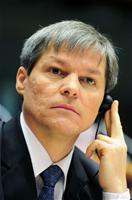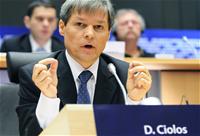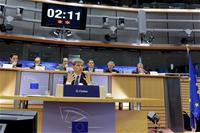Dacian Ciolos - reformer and a conservative in one person
euinside, January 26, 2010
 One of the most difficult fields in the new European Commission was given to the Romanian Commissioner-designate Dacian Ciolos - agriculture and rural development. Obviously Romania has deserved confidence given that their first representative in the Commission after Romania joined the EU was given the field of multilingualism. The hearing of Ciolos in the European Parliament was expected eagerly because of the crisis with the Bulgarian nominee Rumyana Zheleva who raised doubts that the new member states are unable to send adequate representatives in the European institutions.
One of the most difficult fields in the new European Commission was given to the Romanian Commissioner-designate Dacian Ciolos - agriculture and rural development. Obviously Romania has deserved confidence given that their first representative in the Commission after Romania joined the EU was given the field of multilingualism. The hearing of Ciolos in the European Parliament was expected eagerly because of the crisis with the Bulgarian nominee Rumyana Zheleva who raised doubts that the new member states are unable to send adequate representatives in the European institutions.
And the field is difficult because it deals entirely with the Common Agriculture Policy (CAP) which is subject to conflicts within the EU each time when the new financial perspectives are been negotiated. The members of the parliamentary Committee for agriculture and rural development expressed satisfaction with the hearing which lasted a little longer than 3 hours. However, in its very beginning the hearing has been premised by the chairman of the Committee - the Italian socialist MEP Paolo da Castro who reminded that a general reform is being considered for reduction of the funds on the CAP: "I see this as a paradox - the necessity to reconsider the CAP which made such a progress, now there is a risk the funds for it to be stopped because of some competition for resources among different policies and this will hamper agriculture from responding to the new challenges. I hope that you will say that this is not your vision. We very much like to receive such an assurance today, during your hearing".
With such a start of the discussion, the Romanian candidate found it hard to formulate his priorities but, surprisingly Mr Ciolos managed brilliantly. He came out of the situation by explaining that his major priority would be the definition and perspectives of the CAP for the period after 2013 when the new 7-year financial perspectives of the EU start. "Consumers need safe and good products and taxpayers require their money to be spent effectively, transparently and strictly. The future CAP should be a European and balanced policy", Dacian Ciolos added.
In his responses to the numerous questions he announced taking the difficult task to find the balance among the interests of the farmers, consumers, the market and the temptation to intervene on the market for agriculture goods. A task which proved to be very difficult for the previous Commissioner Marianne Fischer-Boel who faced several times protests of milk producers because of the sharp drop of milk prices and the over production in the highly subsidized field of milk production.
One of the ways to achieve this balance, according to the Romanian candidate, is by discussing the issue of subsidies and market interventions on international level in the corresponding formats. This will also be the crossing point in his work with his colleagues in the Commission. But these discussions should be put in the context of standardizing the requirements - the conditions the European producers have to meet for their production to be applied for the imported one as well. Thus the participants on the European market and the international one will be more equal. The main problem for the European farmers at the moment is that their production is with a very high quality which makes it expensive because of the many requirements for quality and hygiene.
All the same, the candidate insisted that there will be a reform in the CAP - something which is difficult to achieve since the very creation of the policy when its budget was around 70% of the overall European budget. Currently, the money for agriculture in the EU represent a little over 40 percent of the budget of the Community*. There is an agreement in principle the money to be reduced further so that more funds are allocated for the the new EU policies. In fact, this is where Dacian Ciolos supported the French position that it was possible the CAP to be reformed without reducing the money for it.
This can be achieved by allocating part of the climate change budget to agriculture with the aim to stimulate climate change adapted crops as well as for reduction of carbon dioxide from agriculture. By the way Ciolos's nomination raised speculations that he would be the second French  Commissioner because of the sharp jump in portfolios - from multilingualism to agriculture. France is the nation which gets the biggest share of the money from CAP and is the sharpest opponent against reduction of farm subsidies.
Commissioner because of the sharp jump in portfolios - from multilingualism to agriculture. France is the nation which gets the biggest share of the money from CAP and is the sharpest opponent against reduction of farm subsidies.
"After the enlargement of Europe agriculture has changed a lot and now we are talking about enormous amounts of money but for me reform does not mean reduction of the funds for CAP but rather removal of certain mechanisms. For me the reform is adaptation to new challenges", replied the candidate asked to clarify his position whether he was a reformer or not.
Mr Ciolos added that he would try to find better criteria for subsidies when reforming the CAP. Currently, according to a research of non-governmental organisations, farm subsidies usually get the big landowners, among which part of the royal families in Europe. One such criteria could be the definition of farmers whether they are active or not. Active, according to Ciolos will be those farmers who produce food products, who realise some profit and who create added value from their professional activities.
The nominee for Agriculture and Rural Development Commissioner also said that rural development policy should remain within the CAP - the main reason was that the small farms represented a significant share of new member states agriculture as well as in Southern Europe. CAP funds could be relocated to modernisation of small farms so as th help them produce safer products as well as to develop local markets. It is also not obligatory the small farms to work for export - instead they could focus on national products. Another way to develop local markets is short local schemes.
 An issue that was very discussed during the hearing of Dacian Ciolos was the effect of farm subsidies in general. "I think that direct payments have good impact on farmers' incomes. I think that this mechanism should be kept. Let us find a balance between the two pillars regarding the direct payments. We will have an opportunity to do this but I will say this again - direct payments have an important role - they guarantee minimal incomes of the framers and I don't see a reason for their removal", Dacian Ciolos said.
An issue that was very discussed during the hearing of Dacian Ciolos was the effect of farm subsidies in general. "I think that direct payments have good impact on farmers' incomes. I think that this mechanism should be kept. Let us find a balance between the two pillars regarding the direct payments. We will have an opportunity to do this but I will say this again - direct payments have an important role - they guarantee minimal incomes of the framers and I don't see a reason for their removal", Dacian Ciolos said.
Regarding the budget for the CAP the MEPs caused a conflict between the Romanian candidate and his Polish colleague Janusz Lewandowski who took the budget policy of the EU because he announced a reduction and gradual stop of direct payments. Mr Ciolos replied this: "CAP should have a significant budget because the money is not only for the producers. We are talking about the feeding of the EU, about the food industry, about industry that creates a lot of jobs. And I hope that 1 day we will not see that we had done too little for the European agriculture, that we had not supported it but it was too late".
The members of the Agriculture and Rural Development Committee finished the hearing with satisfaction. Not that satisfied were the members of the CAP reform blog who asked 25 questions to Dacian Ciolos, most of which the MEPs asked. One of the founders of the blog Jack Thurston who is among the initiators of the idea farm subsidies beneficiaries to be announced publicly, criticised the performance of Ciolos and defined it as "lack-lustre performance both in style and substance". However, his colleague Alan Matthews said that Dacian Ciolos was faced with a totally one-sided perspective on agricultural policy by agrarian representatives.
He asked why there were no representatives at the hearing from the Committee on Development, the Environment Committee, the Committee on Budgets. All of these groups have a legitimate interest in agricultural policy, Matthews writes. Given these circumstances he defined the Romanian candidate's performance as balanced and reasonable.
*More about the agreement for the volume of the CAP in the current financial perspectives 2007-2013 you can read on euinside here.